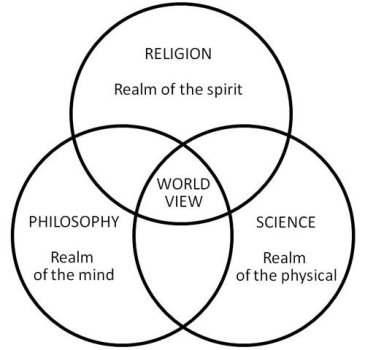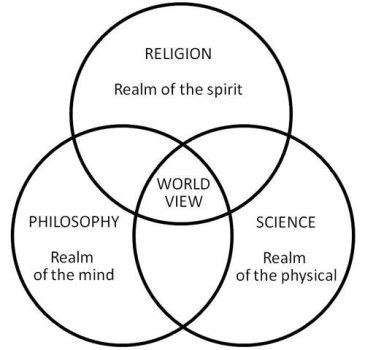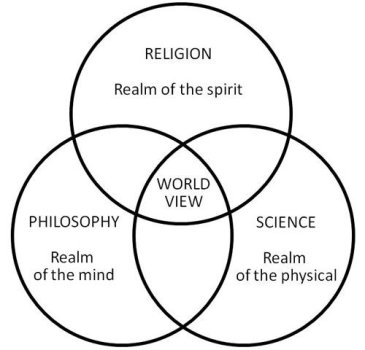Where does our world view come from?
- Thread starter St. SteVen
- Start date
-
Welcome to Christian Forums, a Christian Forum that recognizes that all Christians are a work in progress.
You will need to register to be able to join in fellowship with Christians all over the world.
We hope to see you as a part of our community soon and God Bless!
You are using an out of date browser. It may not display this or other websites correctly.
You should upgrade or use an alternative browser.
You should upgrade or use an alternative browser.
How about....we see things as WE are not as they are really. We learn things, or we think we learn things by our varied experiences. However, all these experiences are through a corrupted nature....so then we really know how NOT to do things. Then, there's God's way. :)I saw this interesting Venn diagram that gave a good picture of where our world view comes from.
- Do you agree?
- Are there other models to consider?
- Should these three be in balance? (as shown)
- What happens if they are out of balance?
View attachment 39958
/
What would your Venn diagram look like then?How about....we see things as WE are not as they are really. We learn things, or we think we learn things by our varied experiences. However, all these experiences are through a corrupted nature....so then we really know how NOT to do things. Then, there's God's way. :)
Or how would that alter the one presented in the OP?
Or would it alter how it is is seen or used?
Please elaborate if you care to. Thanks.
/
I agree with the diagram basically (although not with religion being conflated with the realm of the Spirit). I just see the available understanding in the limitations of the flesh to be a carnal one...even as it purports to have an interest in the religious aspect. This is akin to ADDING in Jesus into our own worldview. Certainly not an adequate response to the gospel.What would your Venn diagram look like then?
Or how would that alter the one presented in the OP?
Or would it alter how it is is seen or used?
Please elaborate if you care to. Thanks.
/
As such I would disagree with a religious aspect being the realm of the Spirit. Either everything is in the realm of the Spirit...or nothing. Light and darkness don't mix.
Sure, that makes sense.I agree with the diagram basically (although not with religion being conflated with the realm of the Spirit). I just see the available understanding in the limitations of the flesh to be a carnal one...even as it purports to have an interest in the religious aspect. This is akin to ADDING in Jesus into our own worldview. Certainly not an adequate response to the gospel.
As such I would disagree with a religious aspect being the realm of the Spirit. Either everything is in the realm of the Spirit...or nothing. Light and darkness don't mix.
I guess I take the Venn diagram to be a somewhat secular view (audience) that
would categorize things of the realm of the Spirit as being religious, as opposed to
Science/realm of the physical, or Philosophy/realm of the mind.
As Christians we tend to be a bit persnickety about such terms.
Thus correcting someone that refers to Christianity as a "religion", or the church as a being a physical building.
If we take the diagram for what it is, it's easy to imagine a lot fine folks not having it in balance.
If the Religion bubble is bloated the Philosophy and Science bubbles suffer ignorance.
Same with the other two. If the Science and/or Philosophy bubbles dwarf the Religion bubble, that suffers ignorance.
I have met plenty of fine folks that fit those models.
/
Agreed. Since most have never known anything beside what they were born into outside the spiritual realm...people do take things too far out of balance. I have trouble relating spiritual things to those who think the religious sphere is the same thing.Sure, that makes sense.
I guess I take the Venn diagram to be a somewhat secular view (audience) that
would categorize things of the realm of the Spirit as being religious, as opposed to
Science/realm of the physical, or Philosophy/realm of the mind.
As Christians we tend to be a bit persnickety about such terms.
Thus correcting someone that refers to Christianity as a "religion", or the church as a being a physical building.
If we take the diagram for what it is, it's easy to imagine a lot fine folks not having it in balance.
If the Religion bubble is bloated the Philosophy and Science bubbles suffer ignorance.
Same with the other two. If the Science and/or Philosophy bubbles dwarf the Religion bubble, that suffers ignorance.
I have met plenty of fine folks that fit those models.
/
Last edited:
Yes.Greed. Since most have never known anything beside what they were born into outside the spiritual realm...people do take things too far out of balance. I have trouble relating spiritual things to those who think the religious sphere is the same thing.
Certainly being raised in a church tradition does not automatically put a person in touch with the spiritual realm.
Religion, in general, makes an attempt to point us in that direction. But without a spiritual connection to the divine
we are left with religious ideas about what that even means. Religion tends to offer fleshly means to reach a spiritual goal.
And different individuals may find different religious practices to give them some form of satisfaction in this area.
Ultimately we need to discover that we are human beings, not human doings.
Who we are has much more spiritual value than what we do. IMHO
Being born in a garage does not make you a car. - LOL
/
I think a big part of our world view is US - who we are genetically, psychologically, culturally, socially and all the rest. It is very difficult to get out of our own way. This is kind of the subject of a blog entry I wrote yesterday. I wasn't too happy with it, but is does make the core point that most people are unaware of who THEY are and how much this influences their thinking.

 www.christianityboard.com
www.christianityboard.com
Most peoples' worldview - including mine - simply won't mesh with the Venn diagram. I've said that our worldview is inevitably the product of our Experiences, Observations, Studies, Reflection and Intuition - but what those elements contain is going to vary tremendously from individual to individual. I would now add a sixth element: Who We Are to Start With.
Know Thyself - An Important Aspect of the Journey of Faith
I've previously mentioned Christian philosopher (epistemologist) Alvin Plantinga and his influential Reformed Epistemology. Just to refresh your memory, he argues that Christian belief can be epistemologically justified without any evidence at...
Most peoples' worldview - including mine - simply won't mesh with the Venn diagram. I've said that our worldview is inevitably the product of our Experiences, Observations, Studies, Reflection and Intuition - but what those elements contain is going to vary tremendously from individual to individual. I would now add a sixth element: Who We Are to Start With.
Agree.Most peoples' worldview - including mine - simply won't mesh with the Venn diagram. I've said that our worldview is inevitably the product of our Experiences, Observations, Studies, Reflection and Intuition - but what those elements contain is going to vary tremendously from individual to individual. I would now add a sixth element: Who We Are to Start With.
And not only would the elements vary per person, but the balance (or form) of the diagram.
I asked these questions in the OP.
- Should these three be in balance? (as shown)
- What happens if they are out of balance?
For many Christians, the Philosophy and Science circles might be dwarfed by the Religion circle.

/
Augustin56
Well-Known Member
Just a side thought...
We humans were designed to seek truth, goodness, beauty, etc., but not just any truty, goodness or beauty. We were designed to see perfect truth, perfect goodness, perfect beauty, etc. We all suffer, however, from the effects of Original Sin, namely, darkness of intellect and weakness of will. In other words, we can often get things wrong. The study of how we "know" things is called epsistemology.
Our society, furthermore, has been tainted by several things, making it much harder to seek and know that which we were designed to seek.
Rene Descartes did a lot of damage to philosophy. He started his entire philosophical endeavor on skepticism, and it was based on this. He said: if I take a stick and I stick it in the water, the stick looks like it's bent, but I know intellectually that it doesn't bend right, and so I can't trust my senses to tell me the truth. Now look at what he just did. He separated the criteria from truth, from reality and knowledge through your senses to purely what's in your own mind. That was the very beginning of that. Okay, that skepticism then gets passed on. What he missed, was that what he was seeing was correct. The reflection of the light was being bent by the water, not the stick.
Then, there was Emmanuel Kant, who concluded from Descartes’ claim, that there is no way we can ultimately know reality. And because we can't know reality, because ultimately all I can know is my experience of reality, that became the cornerstone to modernism (the heresy of modernism).
Both of these errors gave rise to Rationalism, which is the philosophical view that reason should be the chief source of knowledge. (Rather than reality.)
This gave rise to all sorts of errors, which is the cause of much of what we see today.
We humans were designed to seek truth, goodness, beauty, etc., but not just any truty, goodness or beauty. We were designed to see perfect truth, perfect goodness, perfect beauty, etc. We all suffer, however, from the effects of Original Sin, namely, darkness of intellect and weakness of will. In other words, we can often get things wrong. The study of how we "know" things is called epsistemology.
Our society, furthermore, has been tainted by several things, making it much harder to seek and know that which we were designed to seek.
Rene Descartes did a lot of damage to philosophy. He started his entire philosophical endeavor on skepticism, and it was based on this. He said: if I take a stick and I stick it in the water, the stick looks like it's bent, but I know intellectually that it doesn't bend right, and so I can't trust my senses to tell me the truth. Now look at what he just did. He separated the criteria from truth, from reality and knowledge through your senses to purely what's in your own mind. That was the very beginning of that. Okay, that skepticism then gets passed on. What he missed, was that what he was seeing was correct. The reflection of the light was being bent by the water, not the stick.
Then, there was Emmanuel Kant, who concluded from Descartes’ claim, that there is no way we can ultimately know reality. And because we can't know reality, because ultimately all I can know is my experience of reality, that became the cornerstone to modernism (the heresy of modernism).
Both of these errors gave rise to Rationalism, which is the philosophical view that reason should be the chief source of knowledge. (Rather than reality.)
This gave rise to all sorts of errors, which is the cause of much of what we see today.
MA2444
Well-Known Member
I saw this interesting Venn diagram that gave a good picture of where our world view comes from.
- Do you agree?
- Are there other models to consider?
- Should these three be in balance? (as shown)
- What happens if they are out of balance?
View attachment 39958
/
I think the diagram is incorrect. Wouldn't Philosophy and Science both be in the realm of the mind? So I think we can say that the realm of the mind includes the physical part.
But God does things in threes so we have to put something back if we have combined two of them....
That is, The Realm Of The Heart. Scripture says our heart thinks and the heart certainly encompasses (ties in to) both the Spiritual realm and the Physical.
As you're suggesting, and as I suggested, the contents of the circles and the size of them will vary from person to person. Alas, for many people, the Religion circle should be separated from the others - it isn't even INFORMED by Philosophy or Science. Indeed, it's almost empty, void of thought or introspection. Many people would simply replace the Religion circle with a Bible circle and erect walls separating it from Science and Philosophy.For many Christians, the Philosophy and Science circles might be dwarfed by the Religion circle.
Actually, virtually all sages from all religions, and even a fair number of scientists, insist that Intuition is the route to the highest form of knowledge. Not some spooky sixth sense but actually the route to the highest form of knowledge. I've been struck by how often this point is made in my reading.Both of these errors gave rise to Rationalism, which is the philosophical view that reason should be the chief source of knowledge. (Rather than reality.)
Descartes was simply exploring what he could actually KNOW. Consistent with Kant, it is undeniably true that we do not experience Reality. What we experience is filtered through our senses and interpreted by our brains. Is the reality of an orange what we perceive, what it looks like under an electron microscope or what quantum physics suggests it is? Rationalism doesn't separate "reason" and "reality." It teaches that our convictions about reality should be based on reason and knowledge (including, I would say, intuition) rather than religious belief or emotional response.
Wrangler
Well-Known Member
I think the diagram is incorrect. Wouldn't Philosophy and Science both be in the realm of the mind?
No. Although you are partially right as some science is theoretical, it's foundation remains physical. One example I love is when an eclipse would prove or disprove Einstein's Theory of Relativity. A cruise ship was chartered south of the equator with big fanfare. He developed the theory "on the shoulders of giants" who had also physically confirmed what they could. A star seen on the cruise ship had to be altered something like 4.6 degrees off exactly for Einstein's Theory of Relativity to be confirmed. The theory did not allow for wiggle room. Either the star was 4.6 degrees off by measurement or the theory was wrong.
The physical measurement, confirmed in many places around the world won the day.
Besides Method, what separates science from other art forms is Empiricism, doing an experiment that is repeatable. Hence, the reliance on the physical as other minds can confirm or contest the hypothesis.
When the good folks heading up the research on the COVID vaccine want legal protection from publishing their experimental results for 75 years, you know they are not engaging in good or real or actual science.
Lambano
Well-Known Member
N.T. Wright writes rightly (hah!) that "Worldview" contains the answers to these 5 questions:
- Who are we?
- Where are we?
- What's wrong?
- What's the solution?
- What time is it?
That's good. But I wonder if it should be personalized.N.T. Wright writes rightly (hah!) that "Worldview" contains the answers to these 5 questions:
- Who are we?
- Where are we?
- What's wrong?
- What's the solution?
- What time is it?
- Who am I?
- Where am I?
- What's wrong with me?
- What's the solution to me? - LOL
- What time is it? (time for lunch)
/
Lambano
Well-Known Member
That's good. But I wonder if it should be personalized.
Who am I?
Where am I?
What's wrong with me?
What's the solution to me? - LOL
What time is it? (time for lunch)
Taking that inappropriately seriously...
Reducing "Worldview" to the individual level takes "Community" out of the equation. The book I was referencing was dealing with shared Community worldview.
Hmm. Perhaps we (I originally wrote "wee") in the 21st century Western world no longer have a shared community worldview. Or our communities are pretty shallow. No wonder most threads end up in a pissing contest.
Last edited:
I suppose most people don't want their worldview dictated to them by a community. ???Taking that inappropriately seriously...
Reducing "Worldview" to the individual level takes "Community" out of the equation. The book I was referencing was dealing with shared Community worldview.
Hmm. Perhaps we (I originally wrote "wee") in the 21st century Western world no longer have a shared community worldview. Or our communities are pretty shallow. No wonder most threads end up in a pissing contest.
/
Science investigates and attempts to explain the natural order. The foundation of science is the assumption that the natural order is causal, rational and understandable. Science begins with observations about some aspect of the natural order. On the basis of those observations, science formulates a hypothesis - a tentative explanation. It then makes predictions and engages in further observations and/or testing to confirm or falsify the hypothesis. If the hypothesis is confirmed, it becomes a working hypothesis or theory. If it is not confirmed, it is modified or rejected. According to the nature of what is being investigated, some science is highly theoretical and some is mostly empirical. There is no science apart from the fundamental assumptions and the minds of those making the assumptions, formulating the hypotheses and theories, and interpreting the observations and tests.No. Although you are partially right as some science is theoretical, it's foundation remains physical. One example I love is when an eclipse would prove or disprove Einstein's Theory of Relativity. A cruise ship was chartered south of the equator with big fanfare. He developed the theory "on the shoulders of giants" who had also physically confirmed what they could. A star seen on the cruise ship had to be altered something like 4.6 degrees off exactly for Einstein's Theory of Relativity to be confirmed. The theory did not allow for wiggle room. Either the star was 4.6 degrees off by measurement or the theory was wrong.
The physical measurement, confirmed in many places around the world won the day.
Besides Method, what separates science from other art forms is Empiricism, doing an experiment that is repeatable. Hence, the reliance on the physical as other minds can confirm or contest the hypothesis.
When the good folks heading up the research on the COVID vaccine want legal protection from publishing their experimental results for 75 years, you know they are not engaging in good or real or actual science.
The statement about the Covid-19 vaccines is incorrect. No one wanted legal protection for 75 years, In response to an FOIA request, the FDA proposed releasing 450,000 pages of Pfizer research at the rate of 500 pages per month because its FOIA staff comprises only ten employees. The judge ordered the release of 55,000 pages per month. Insofar as I know, the FDA has been complying.
The usual nutcase news sources, of course, put a sinister spin on everything. To wit:
A startling prediction about what will soon come upon the world in the form of genocide is backed by the infamous Pfizer documents, which outline the five-year plan starting in 2020 to massively depopulate the world by the year 2025.
Heavily CENSORED Pfizer Documents Show COVID Began Five-Year MASS DEPOPULATION Agenda that Will Reach Completion by 2025 | The Paradise News
This is more than likely one of the reasons why the FDA plotted to delay the release of the Pfizer documents for a full 75 years.
theparadise.ng
Lambano
Well-Known Member
Think of how communities work. They propagate their worldviews through education, social conditioning, reward-punishment, etc. Also remember that for most of history and in most cultures, membership in a community was and is necessary for survival in a hostile world.I suppose most people don't want their worldview dictated to them by a community. ???
/
But, here in 21st century America, we glorify individualism and non-conformity. And we end up "Bowling Alone".
Similar threads
- Replies
- 6
- Views
- 249
- Replies
- 4
- Views
- 137
- Replies
- 20
- Views
- 494
- Replies
- 2
- Views
- 107



